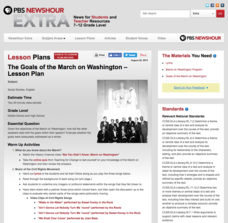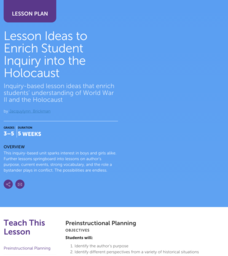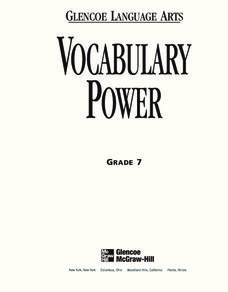NASA
Decomposers Get Energy From Dead Things
When life gives you mold, make penicillin. Scholars design an inquiry experiment to determine what causes rotting and mold growth. It also covers decomposers and the important role they play for other living things.
Historical Thinking Matters
Social Security: 5 Day Lesson
Did the New Deal fundamentally shift the role of the American government in the economy? Your class members will examine the interpretations of various historians in answering this question, and use a variety of primary and secondary...
NASA
Producers Make Their Own Food
During an inquiry-based lesson, scholars decide which variable to test and then design an experiment to determine the needs of producers. After two weeks, they complete a full analysis and research paper.
University of California
Roots of the Cold War
When and how did the Cold War begin? To answer this question, you will not find a better-organized, in-depth, activity- and inquiry-based resource than this! Executing best teaching practices throughout, each portion of this inquiry...
Towson University
Mystery Disease
How did scientists determine the cause of illness before technology? Science scholars play the role of medical researcher in an engaging guided inquiry activity. Using observations, technical reading, and Punnett squares, learners...
Baylor College
Serving Sizes
Are serving sizes for different foods always appropriate for what you need? In this hands-on activity, learners work in groups to estimate what one serving size of various foods are, and then evaluate their hypotheses by measuring real...
California Academy of Science
Human Evolution
As the great and hilarious Tim Minchin once said, "Science is simply the word we use to describe a method of organizing our curiosity." Science is more than just a guess; it is based on questions, observations, and evidence. High...
Facing History and Ourselves
Hands Up, Don't Shoot!
Why is it so difficult to develop a clear understanding of the events surrounding the shooting of Michael Brown by a Ferguson, Missouri, police officer? To answer this question class members listen to a NPR discussion of the findings of...
PBS
The Goals of the March on Washington
Who else had a dream other than Martin Luther King, Jr.? Pupils explore civil rights leaders in a fourth lesson out of a series of five about people who paved the way to freedom for African Americans. The inquiry-based unit has your...
Scholastic
Study Jams! Scientific Theory & Evidence
Introduce someday scientists to ideas and explanations about how the world around us works by showing this cute cartoon. In it, Mia and Sam discuss what scientific theory is, and how it is important in discovering scientific laws making...
Curated OER
Introduction To Fractals: an Inquiry
Learners evaluate a playful case study about a dog searching for fetching sticks to identify the steps in the science inquiry method. They read the case study and fill in a worksheet with the examples of questions, observations and...
Scholastic
Study Jams! Investigations to Collect Data
Print out the lyrics or show the karaoke video to get your scientists singing about the scientific process! Participants will warble about observations and measurements, data and physical properties. Consider sharing this resource after...
Curated OER
View: Visual Inquiry/Experience in Writing
Students discuss the importance of having good observational skills. Using artifacts, they discuss what can and cannot be told about previous cultures. They use their observations to write a paper about the culture and use the internet...
Curated OER
Lesson Ideas to Enrich Student Inquiry into the Holocaust
Students inquire about the Holocaust. In this Holocaust lesson, students read books and discuss their thoughts. Students also collect current event articles from newspapers. Students investigate ghettos, Pearl Harbor and Navajo Code...
Curated OER
Letters of Inquiry
Young scholars compose letters of inquiry. In this written communication lesson, students read sample letters of inquiry about sites in Washington, D.C. Young scholars then write their own letters of inquiry to the Washington, D.C....
Curated OER
Inquiry
Students read and discuss the main points in the paragraphs about trees, fruit orchards, primary forests, and data. In this inquiry discussion lesson plan, students discuss how to pick out the main points of science related information.
Crabtree Publishing
Why Does Media Literacy Matter?
Criticism of news and entertainment journalism is at an all-time high. Help 21st-century learners develop the media literacy skills they need to become critical consumers with a three-lesson guide the looks at persuasive techniques used...
Curated OER
How hard is it?
Inquiry is probably one of the most fun ways kids learn. They will test the hardness of 10 different minerals in order to classify them. They rate each of the minerals from most to least hard. Note: Having real minerals for this...
Curated OER
Tell Me More
Fifth graders demonstrate research techniques in addition to endeavoring to display focus and stay on topic. Using books and stories, they gather, organize, and share information about a topic. Additionally, they explain to the class...
Texas Center for Learning Disabilities
Fourth-Grade Text-Based Intervention
Provide young readers with the extra support they need using this series of 10 literacy lessons. Following a repeated sequence of learning activities, these lessons engage children in expanding their vocabulary and developing their...
McGraw Hill
Vocabulary Power
Augment your language arts units with a set of vocabulary worksheets. The packet is an excellent support to your vocabulary instruction that covers a variety of skills, including context clues, Greek and Latin roots, reference materials,...
Space Awareness
Let's Break the Particles
Build learning by breaking atoms! Young scientists study the way energy changes with a hands-on activity. As they roll steel marbles down a ramp, learners test the hypothesis that kinetic energy does not go away with friction or...
American Chemical Society
What Makes It Snow?
Discover the icy world of snow from the comfort of the indoors. Young meteorologists study visuals and a video to examine snow formation and structure. Using the information they learn, scientists follow a procedure to construct a...
Curated OER
Web It
Students study spider webs. In this lesson on spiders, students carefully examine spider webs and try to determine how a spider web works to trap the spider's prey without the spider sticking to his own web.
Other popular searches
- Scientific Inquiry Skills
- Science Inquiry Skills
- Inquiry Skills Five Senses
- Using Inquiry Skills
- Teaching Inquiry Skills
- Math and Inquiry Skills
- Basic Inquiry Skills
- Research and Inquiry Skills
- Name 5 Inquiry Skills
- Social Studies Inquiry Skills
























